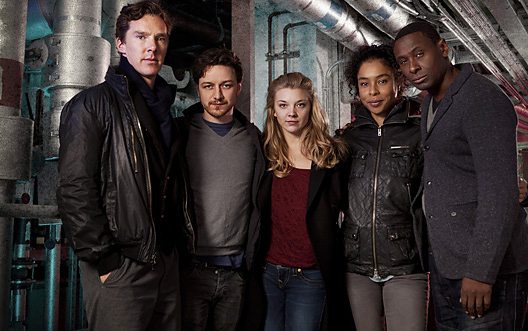 Still from The Hobbit, starring Martin Freeman. Due out next year.
Still from The Hobbit, starring Martin Freeman. Due out next year.
As a writer, I have a great (perhaps natural) interest in books that grow up to be made into films. I do get a little queasy, however, when such a film deviates from its original material to the extent that it is an entirely different story. But I always come back to my philosophy: a novel and a film are two completely different art forms - words and images - therefore, they cannot and will not be able to convey a story in the exact same way.
Twilight and
Harry Potter aside, the biggest discussions I've heard (and perhaps been a part of) in the last several years, have inv0lved the innumerable film adaptations of Jane Austen and Charlotte Bronte's novels, new television and film revivals of Sherlock Holmes, an Oscar-contending remake of
Tinker, Tailor, Soldier, Spy, and excitement over
The Hunger Games, which hits theaters in March.
The Hunger Games, by the way, looks exactly the way I envisioned it. I'll have a quiver in my spine till I can go see it!
There is an unconscious desire among fans for a perfect film version of
Pride & Prejudice or
Jane Eyre. Many cite the 1995 "Colin Firth" version of
Pride & Prejudice as "the best", whereas others appreciate the simple, natural beauty of the 2005 film. For
Jane Eyre, the debate has recently been strung between the 2006 BBC version starring Ruth Wilson, and last year's film starring Mia Wasikowska. There are as many opinions as there are films. One thing it does show us is that these stories resonate strongly... that we want to see it retold again and again, from different camera angles, with different faces, with new music, in new colors. This kaleidoscope of story is an incredibly beautiful thing!
What prompted my thoughts today is a quiver of excitement about
The Hobbit. A trailer was released this week, a year in advance. I have to say I was skeptical about
The Hobbit being brought to film (actually two), as the story, frankly, is a bit of a hiccup of events prior to
The Lord of the Rings. Knowing Peter Jackson, I am well aware that liberties will be taken, that story lines may be embellished, and the final product will be spectacular.
Having seen the trailer, I am excited - not because this is a translation of a beloved story into film, but because it looks as good as
The Lord of the Rings.
The Lord of the Rings, books and films, has an incredibly special place in my heart. I will see
The Hobbit next year knowing 1.) this is a mixture of Jackson's storytelling with Tolkein's storytelling; 2.) it will have a lot more in it than the book did; 3.) I may not agree with some of these creative changes, but; 4.) I will enjoy it very much.
In other words, to boycott a film because it isn't exactly like the book is silly. In
some ways, perhaps the film of
The Hobbit will delve deeper into plots and journeys (and not just because this story happens to feature a company of dwarves). That's possible, isn't it? But even if it is "better" or least "flashier" than the book, the film can in no way replace the book. A film is only a retelling.
One more example of novel-into-film is Neil Gaiman's
Stardust. Book and film do not match because the story is told in different ways: the book is far more mysterious, magical and shadowy than the film; the film is faster, more adventurous and more perilous than the book. I love them both, just as I love the original and retold versions of
The Lord of the Rings,
Pride & Prejudice, and
Jane Eyre.
***
As a side note, I am a little curious about
The Girl With the Dragon Tattoo, mostly as a study in character. What I've read of Stieg Larsson's Lisbeth Salander intrigues me, but I am not sure I'd want to be witness to the violence and brutality that inevitably comes with the story. I'll have to get back to you on that one.




